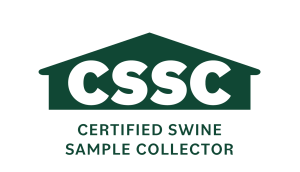“In the event of a large-scale foreign animal disease outbreak, such as African swine fever, we will need a trained cadre of sample collectors to help Federal and State animal health officials determine where disease is present and to support the permitted movement of animals. The Certified Swine Sample Collector Training Program benefits from the oversight of USDA Category II accredited veterinarians and will significantly increase the number of qualified people who can correctly collect, package, and submit samples so we have confidence in the results. This training program was funded by USDA’s National Animal Disease Preparedness and Response Program, which fosters collaboration with animal health partners to implement high-value projects that enhance our ability to prevent, detect, prepare and respond to foreign animal diseases.”
Dr. Jack Shere
Associate Administrator
U.S. Department of Agriculture
Animal and Plant Health Inspection Service
State Animal Health Officials (SAHOs) request that prior to participating in the program, USDA Category II accredited veterinarians contact the SAHO in the state(s) where they plan to train or use Certified Swine Sample Collectors to confirm their eligibility to participate in the program and any additional requirements that exist.

